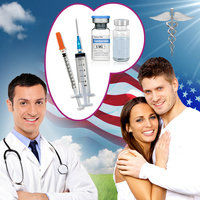Introduction
Testosterone Enanthate, a widely used anabolic steroid, has been a subject of interest in the medical community, particularly regarding its impact on various organ systems. This article delves into the effects of Testosterone Enanthate on kidney function, specifically in American males diagnosed with chronic kidney disease (CKD). Understanding these effects is crucial for healthcare providers to tailor treatments that optimize patient outcomes while minimizing potential risks.
Understanding Chronic Kidney Disease
Chronic Kidney Disease is a progressive condition characterized by the gradual loss of kidney function over time. In the United States, CKD affects millions of men, often leading to significant health challenges, including cardiovascular disease and end-stage renal disease. The management of CKD involves a multifaceted approach, including lifestyle modifications, pharmacological interventions, and, in some cases, hormone therapy.
The Role of Testosterone Enanthate
Testosterone Enanthate is an injectable form of testosterone, commonly used to treat conditions associated with low testosterone levels, such as hypogonadism. Its long-acting nature makes it a popular choice for hormone replacement therapy. However, its use in patients with CKD requires careful consideration due to potential impacts on renal function.
Effects on Kidney Function
Recent studies have explored the relationship between Testosterone Enanthate and kidney function in males with CKD. Research indicates that testosterone can influence kidney health through several mechanisms. Firstly, testosterone has been shown to have a direct effect on renal blood flow and glomerular filtration rate (GFR), which are critical indicators of kidney function. In some studies, testosterone supplementation has been associated with improved GFR in patients with CKD, suggesting a potential protective role.
However, the use of Testosterone Enanthate is not without risks. Elevated testosterone levels can lead to increased erythropoiesis, which may exacerbate hypertension—a common comorbidity in CKD patients. Hypertension, in turn, can accelerate the progression of kidney damage. Therefore, monitoring blood pressure and hematocrit levels is essential when administering Testosterone Enanthate to patients with CKD.
Clinical Considerations and Monitoring
When prescribing Testosterone Enanthate to American males with CKD, healthcare providers must consider several factors. Baseline assessments of kidney function, including serum creatinine levels and estimated GFR, should be conducted before initiating therapy. Regular monitoring of these parameters, along with blood pressure and hematocrit, is crucial to detect any adverse effects early and adjust treatment accordingly.
Additionally, patient education plays a vital role in managing CKD and hormone therapy. Patients should be informed about the potential benefits and risks of Testosterone Enanthate, as well as the importance of adhering to follow-up appointments and monitoring protocols.
Future Research Directions
While current research provides valuable insights into the effects of Testosterone Enanthate on kidney function, further studies are needed to fully understand its long-term impact on CKD progression. Future research should focus on larger, more diverse cohorts and explore the potential synergistic effects of testosterone therapy with other CKD management strategies.
Conclusion
Testosterone Enanthate can have both beneficial and detrimental effects on kidney function in American males with chronic kidney disease. While it may improve certain aspects of renal function, such as GFR, it also poses risks, particularly in relation to hypertension and erythropoiesis. A personalized approach to treatment, coupled with vigilant monitoring, is essential to maximize the benefits of Testosterone Enanthate while safeguarding kidney health. As research continues to evolve, healthcare providers will be better equipped to make informed decisions that enhance the quality of life for men living with CKD.
Contact Us For A Fast And Professional Response

- Testosterone Enanthate: Enhancing Athletic Performance and Associated Risks in American Athletes [Last Updated On: February 26th, 2025] [Originally Added On: February 26th, 2025]
- Tailoring Testosterone Enanthate Therapy for American Men's Health [Last Updated On: March 17th, 2025] [Originally Added On: March 17th, 2025]
- Testosterone Enanthate: Enhancing Muscle Growth and Weight Management in American Men [Last Updated On: March 18th, 2025] [Originally Added On: March 18th, 2025]
- Testosterone Enanthate: Long-Term Effects and Management in American Men [Last Updated On: March 18th, 2025] [Originally Added On: March 18th, 2025]
- Testosterone Enanthate: A Promising Treatment for Sexual Dysfunction in American Males [Last Updated On: March 18th, 2025] [Originally Added On: March 18th, 2025]
- Testosterone Enanthate: Impacts on Prostate Health and Monitoring Guidelines [Last Updated On: March 20th, 2025] [Originally Added On: March 20th, 2025]
- Testosterone Enanthate: Safety, Side Effects, and Management in Hormone Therapy [Last Updated On: March 20th, 2025] [Originally Added On: March 20th, 2025]
- Testosterone Enanthate: A Promising Treatment for Depression in American Men [Last Updated On: March 20th, 2025] [Originally Added On: March 20th, 2025]
- Testosterone Enanthate: Dispelling Myths and Presenting Facts for American Males [Last Updated On: March 20th, 2025] [Originally Added On: March 20th, 2025]
- Testosterone Enanthate: Cycle, Benefits, Risks, and Legal Considerations for Athletes [Last Updated On: March 20th, 2025] [Originally Added On: March 20th, 2025]
- Testosterone Enanthate's Impact on Blood Sugar Levels in American Men: A Review [Last Updated On: March 21st, 2025] [Originally Added On: March 21st, 2025]
- Testosterone Enanthate: A Promising Therapy for Chronic Pain in American Males [Last Updated On: March 21st, 2025] [Originally Added On: March 21st, 2025]
- Testosterone Enanthate's Impact on Sleep Patterns in American Males: Effects and Management [Last Updated On: March 21st, 2025] [Originally Added On: March 21st, 2025]
- Testosterone Enanthate: A Promising Treatment for Osteoporosis in American Men [Last Updated On: March 22nd, 2025] [Originally Added On: March 22nd, 2025]
- Testosterone Enanthate's Impact on Cognitive Function in American Men: Recent Studies [Last Updated On: March 22nd, 2025] [Originally Added On: March 22nd, 2025]
- Testosterone Enanthate: Enhancing Immune Function in American Men [Last Updated On: March 22nd, 2025] [Originally Added On: March 22nd, 2025]
- Testosterone Enanthate: Impacts on Hair Growth and Loss in American Men [Last Updated On: March 22nd, 2025] [Originally Added On: March 22nd, 2025]
- Testosterone Enanthate Therapy: Benefits and Risks for Men Over 50 [Last Updated On: March 23rd, 2025] [Originally Added On: March 23rd, 2025]
- Testosterone Enanthate: A Promising Treatment for Anemia in American Men [Last Updated On: March 23rd, 2025] [Originally Added On: March 23rd, 2025]
- Testosterone Enanthate's Impact on Fertility in American Males: Risks and Management [Last Updated On: March 23rd, 2025] [Originally Added On: March 23rd, 2025]
- Testosterone Enanthate: Cost-Benefit Analysis for Hypogonadism Treatment in American Males [Last Updated On: March 23rd, 2025] [Originally Added On: March 23rd, 2025]
- Testosterone Enanthate's Impact on Mental Clarity in American Men: A Comprehensive Review [Last Updated On: March 24th, 2025] [Originally Added On: March 24th, 2025]
- Testosterone Enanthate Withdrawal: Symptoms, Management, and Long-term Health in American Men [Last Updated On: March 24th, 2025] [Originally Added On: March 24th, 2025]
- Testosterone Enanthate: Ethical Dilemmas in Medical and Non-Medical Use Among American Males [Last Updated On: March 24th, 2025] [Originally Added On: March 24th, 2025]
- Testosterone Enanthate: Enhancing Injury Recovery in American Males - Benefits and Risks [Last Updated On: March 24th, 2025] [Originally Added On: March 24th, 2025]
- Testosterone Enanthate's Impact on Cardiovascular Endurance in American Men: Risks and Benefits [Last Updated On: March 24th, 2025] [Originally Added On: March 24th, 2025]
- Testosterone Enanthate: A Promising Tool for Stress Management in American Men [Last Updated On: March 24th, 2025] [Originally Added On: March 24th, 2025]
- Testosterone Enanthate Therapy: Benefits, Risks, and Management for American Men [Last Updated On: March 25th, 2025] [Originally Added On: March 25th, 2025]
- Testosterone Enanthate's Impact on Eye Health in American Males: A Comprehensive Review [Last Updated On: March 25th, 2025] [Originally Added On: March 25th, 2025]
- Testosterone Enanthate: Enhancing Post-Surgical Recovery in American Men [Last Updated On: March 25th, 2025] [Originally Added On: March 25th, 2025]
- Testosterone Enanthate's Impact on Emotional Well-being in American Males: A Comprehensive Analysis [Last Updated On: March 25th, 2025] [Originally Added On: March 25th, 2025]
- Testosterone Enanthate: Cultural Perceptions and Masculinity in American Males [Last Updated On: March 25th, 2025] [Originally Added On: March 25th, 2025]
- Testosterone Enanthate Boosts Skin Elasticity in American Males: Study Finds [Last Updated On: March 25th, 2025] [Originally Added On: March 25th, 2025]
- Testosterone Enanthate Therapy: Enhancing Veterans' Health and Well-being [Last Updated On: March 26th, 2025] [Originally Added On: March 26th, 2025]
- Testosterone Enanthate: Effects on Muscle, Fat, and Body Composition in American Males [Last Updated On: March 26th, 2025] [Originally Added On: March 26th, 2025]
- Testosterone Enanthate: Combating Muscle Wasting in American Men [Last Updated On: March 26th, 2025] [Originally Added On: March 26th, 2025]
- Testosterone Enanthate: Enhancing Endurance in American Male Athletes - Benefits and Risks [Last Updated On: March 26th, 2025] [Originally Added On: March 26th, 2025]
- Testosterone Enanthate's Impact on Joint Health in American Men: Benefits and Risks [Last Updated On: March 26th, 2025] [Originally Added On: March 26th, 2025]
- Testosterone Enanthate: A Novel Approach to Managing Allergies in American Males [Last Updated On: March 26th, 2025] [Originally Added On: March 26th, 2025]
- Testosterone Enanthate: Enhancing Vitality in Aging American Men [Last Updated On: March 26th, 2025] [Originally Added On: March 26th, 2025]
- Testosterone Enanthate Therapy: Impacts on Kidney Function in American Males [Last Updated On: March 26th, 2025] [Originally Added On: March 26th, 2025]
- Testosterone Enanthate's Impact on Dental Health in American Males: A Comprehensive Review [Last Updated On: March 27th, 2025] [Originally Added On: March 27th, 2025]
- Testosterone Enanthate's Impact on Appetite and Digestion in American Men: A Comprehensive Analysis [Last Updated On: March 27th, 2025] [Originally Added On: March 27th, 2025]
- Testosterone Enanthate: Enhancing Respiratory Function in American Men [Last Updated On: March 27th, 2025] [Originally Added On: March 27th, 2025]
- Testosterone Enanthate: A Promising Treatment for Chronic Fatigue Syndrome in American Males [Last Updated On: March 27th, 2025] [Originally Added On: March 27th, 2025]
- Testosterone Enanthate: A Promising Strategy for Obesity Management in American Males [Last Updated On: March 27th, 2025] [Originally Added On: March 27th, 2025]
- Tailoring Testosterone Enanthate Dosages for American Males: A Comprehensive Guide [Last Updated On: March 28th, 2025] [Originally Added On: March 28th, 2025]
- Testosterone Enanthate Therapy: Impacts on Life Expectancy in American Men [Last Updated On: March 29th, 2025] [Originally Added On: March 29th, 2025]
- Testosterone Enanthate's Impact on Hearing in American Men: Current Research and Insights [Last Updated On: March 29th, 2025] [Originally Added On: March 29th, 2025]
- Testosterone Enanthate: A Promising Approach to Diabetes Management in American Males [Last Updated On: March 30th, 2025] [Originally Added On: March 30th, 2025]
- Testosterone Enanthate: A Promising Therapy for Autoimmune Disorders in American Males [Last Updated On: March 30th, 2025] [Originally Added On: March 30th, 2025]
- Testosterone Enanthate's Impact on Liver Health: Risks and Monitoring for American Men [Last Updated On: March 31st, 2025] [Originally Added On: March 31st, 2025]
- Testosterone Enanthate: A New Frontier in Treating Gastrointestinal Disorders in American Males [Last Updated On: April 2nd, 2025] [Originally Added On: April 2nd, 2025]
- Testosterone Enanthate: A Promising Therapy for Hypertension in American Males [Last Updated On: April 3rd, 2025] [Originally Added On: April 3rd, 2025]
- Testosterone Enanthate: Enhancing Neurological Function in American Men [Last Updated On: April 4th, 2025] [Originally Added On: April 4th, 2025]
- Testosterone Enanthate: Impacts on Male Fertility and Reproductive Health in American Males [Last Updated On: April 5th, 2025] [Originally Added On: April 5th, 2025]
- Testosterone Enanthate's Impact on Thyroid Function in American Men: A Comprehensive Analysis [Last Updated On: April 5th, 2025] [Originally Added On: April 5th, 2025]
- Testosterone Enanthate: Enhancing Musculoskeletal Health in American Men [Last Updated On: April 9th, 2025] [Originally Added On: April 9th, 2025]
- Testosterone Enanthate: Enhancing Hematological Health in American Men [Last Updated On: April 9th, 2025] [Originally Added On: April 9th, 2025]
- Testosterone Enanthate: A Promising Treatment for Respiratory Disorders in American Men [Last Updated On: April 9th, 2025] [Originally Added On: April 9th, 2025]
- Testosterone Enanthate's Impact on Immune Function in American Males: A Comprehensive Review [Last Updated On: April 9th, 2025] [Originally Added On: April 9th, 2025]
- Testosterone Enanthate's Impact on Adrenal Health in American Males: A Detailed Analysis [Last Updated On: April 9th, 2025] [Originally Added On: April 9th, 2025]
- Testosterone Enanthate's Role in Managing Metabolic Disorders in American Males [Last Updated On: April 10th, 2025] [Originally Added On: April 10th, 2025]
- Testosterone Enanthate: A New Frontier in Dermatological Treatment for American Men [Last Updated On: April 11th, 2025] [Originally Added On: April 11th, 2025]
- Testosterone Enanthate: Potential Neuroprotective Benefits for American Males with Neurological Disorders [Last Updated On: April 12th, 2025] [Originally Added On: April 12th, 2025]
- Testosterone Enanthate: Benefits, Risks, and Management for American Men's Health [Last Updated On: April 12th, 2025] [Originally Added On: April 12th, 2025]
- Testosterone Enanthate's Cardiovascular Impact on American Males: Risks and Recommendations [Last Updated On: April 13th, 2025] [Originally Added On: April 13th, 2025]
- Testosterone Enanthate's Impact on Gastrointestinal Health in American Males [Last Updated On: April 14th, 2025] [Originally Added On: April 14th, 2025]
- Testosterone Enanthate: A Promising Treatment for Musculoskeletal Disorders in American Males [Last Updated On: April 15th, 2025] [Originally Added On: April 15th, 2025]
- Testosterone Enanthate: Managing Endocrine Disorders in American Males [Last Updated On: April 17th, 2025] [Originally Added On: April 17th, 2025]
- Testosterone Enanthate Therapy: Impacts on Male Reproductive Health and Fertility [Last Updated On: April 18th, 2025] [Originally Added On: April 18th, 2025]
- Testosterone Enanthate: Enhancing Metabolic Health in American Males [Last Updated On: April 18th, 2025] [Originally Added On: April 18th, 2025]
- Testosterone Enanthate's Impact on Skin Health in American Males: Benefits and Risks [Last Updated On: April 18th, 2025] [Originally Added On: April 18th, 2025]
- Testosterone Enanthate's Role in Enhancing Immune Function in American Men [Last Updated On: April 18th, 2025] [Originally Added On: April 18th, 2025]
- Testosterone Enanthate's Impact on Respiratory Health in American Males: Benefits and Risks [Last Updated On: April 18th, 2025] [Originally Added On: April 18th, 2025]
- Testosterone Enanthate's Impact on Gastrointestinal Health in American Men: A New Frontier [Last Updated On: April 19th, 2025] [Originally Added On: April 19th, 2025]
- Testosterone Enanthate Therapy: Cardiovascular Benefits and Risks for American Men [Last Updated On: April 20th, 2025] [Originally Added On: April 20th, 2025]
- Testosterone Enanthate: Emerging Treatment for Hematological Disorders in American Men [Last Updated On: April 20th, 2025] [Originally Added On: April 20th, 2025]
- Testosterone Enanthate: Managing Low T in American Men - Benefits and Considerations [Last Updated On: April 20th, 2025] [Originally Added On: April 20th, 2025]
- Testosterone Enanthate: Benefits, Risks, and Considerations for American Males [Last Updated On: April 20th, 2025] [Originally Added On: April 20th, 2025]
















